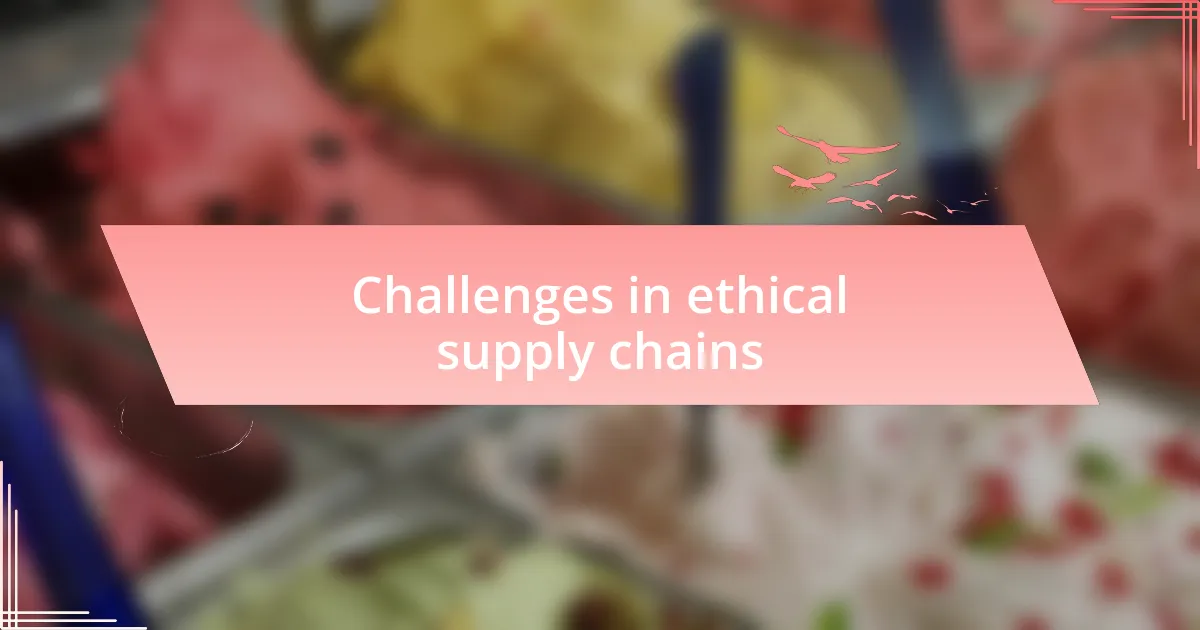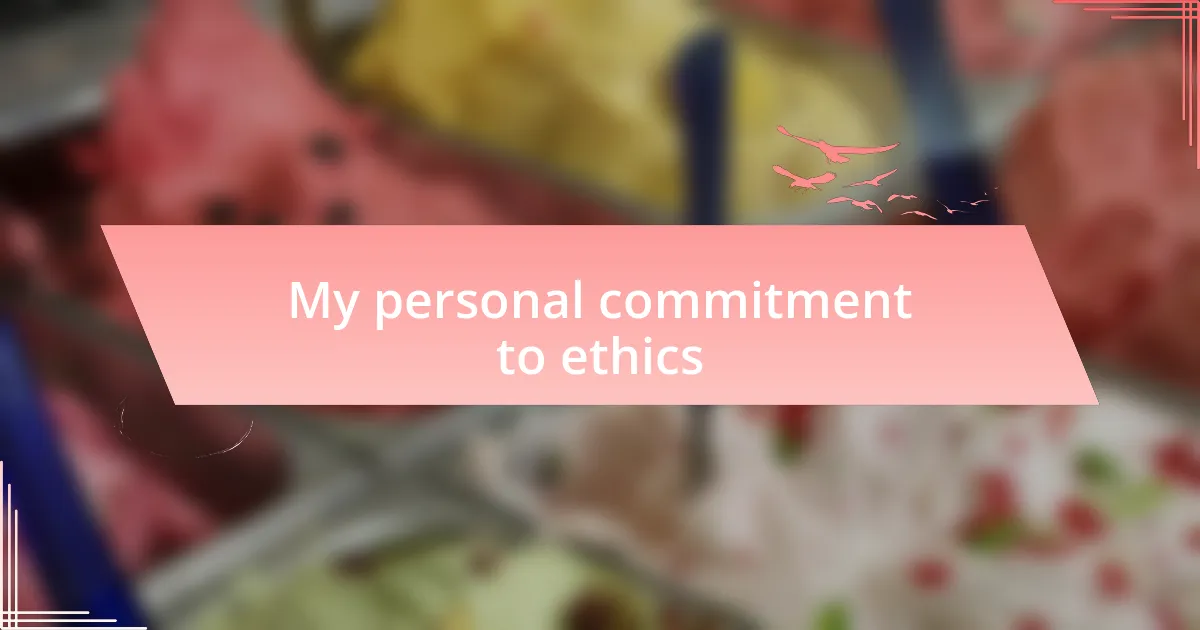Key takeaways:
- Ethical supply chains involve a commitment to transparency and fairness, impacting both communities and the environment.
- Key principles include prioritizing fair labor practices, environmental sustainability, and fostering long-term partnerships with suppliers.
- Effective supply chain analysis requires thorough mapping, assessing supplier ethical standards, and gathering feedback from all stakeholders.
- Implementing sustainable practices necessitates continuous improvement, collaboration with partners, and consistent monitoring and evaluation of efforts.

Understanding ethical supply chains
When I think about ethical supply chains, I realize it’s not just a buzzword; it’s a commitment. This concept encompasses the responsibility of ensuring that every product, from farm to table, is produced in a way that respects both people and the planet. Isn’t it heartening to know that our choices can support farmers who cultivate sustainably and provide fair wages?
There was a moment when I visited a local farm and met the farmers who grew my favorite vegetables. Hearing their stories and struggles made the idea of ethical sourcing feel personal. I often wonder how many consumers truly understand the impact of their purchasing decisions. Each item we buy can either uplift a community or contribute to a cycle of exploitation.
An ethical supply chain also means transparency. As a consumer, I value knowing where my food comes from and how it was produced. It’s not just about what’s on my plate; it’s about the journey of that food before it gets to me. Have you ever questioned the backstory of your groceries? Knowing the narrative makes me appreciate my meals much more.

Key principles of ethical sourcing
One key principle of ethical sourcing is prioritizing fair labor practices. I recall a conversation I had with a fair-trade coffee producer who explained how his cooperative empowers workers through equitable pay and safe working conditions. What struck me was the pride in his voice when he talked about how their commitment to ethical sourcing had transformed their community. This connection between sourcing and social responsibility is vital; when workers are treated well, it reflects directly on the quality of the products.
Environmental sustainability is another cornerstone. During a trip to an organic farm, I was amazed to see how practices like crop rotation and natural pest control not only protect the environment but also enhance soil health. It’s fascinating to think about how these methods result in richer flavors and healthier produce. Have you ever considered that your food choices can help preserve our planet for future generations?
Lastly, fostering long-term partnerships with suppliers shapes ethical sourcing. I remember chatting with a local distributor who emphasized the importance of building relationships with farmers. Instead of a transactional approach, they focus on collaboration and mutual growth. It made me realize that when businesses invest in these relationships, it creates a cycle of trust and commitment, ultimately benefiting everyone involved. Isn’t that a model we should all strive for in the food industry?

Steps for analyzing supply chain
To analyze your supply chain effectively, start with thorough mapping. I recall a project where we plotted each step in our supply chain, from raw materials to consumer delivery. This visualization helped us identify critical points where practices could be improved, and, honestly, it was eye-opening to see the connections we often overlook.
Next, assess the ethical standards of each supplier. I once visited a facility that claimed to uphold high ethical standards. However, upon deeper inquiry, I found discrepancies between their practices and stated values. This experience taught me the importance of not just accepting claims at face value but digging deeper to ensure alignment with ethical sourcing principles.
Lastly, gather feedback from everyone involved in the supply chain, from farmers to consumers. I remember hosting a roundtable discussion with various stakeholders, which revealed valuable insights and firsthand experiences that data alone couldn’t capture. Engaging in these dialogues not only solidified trust but also inspired collective action towards more ethical practices. Have you thought about how you can create such open communication channels in your own supply chain?

Implementing sustainable practices
Implementing sustainable practices in the food business requires a commitment to continuous improvement and innovation. I remember a particular initiative where we transitioned to biodegradable packaging. It wasn’t just about being eco-friendly; it sparked conversations with my team about our overall environmental responsibility, making us more aware of our choices at every level.
Collaboration is another essential element in implementing sustainable practices. During a partnership with a local farmer, we decided to implement crop rotation to enhance soil quality. This relationship taught me that sustainability isn’t just an internal effort; it’s about creating strong ties with partners who share your vision. How can you engage your suppliers in a similar way to drive sustainable changes together?
Monitoring and evaluation are critical components of sustainability. After adopting a new waste reduction strategy, I set measurable goals to track our progress. The data revealed patterns that informed our future decisions, ultimately leading to a 30% reduction in waste over a year. This experience reinforced my belief: how often do we stop to assess the real impact of our sustainable efforts?

Challenges in ethical supply chains
Managing ethical supply chains often feels like navigating a minefield, where one wrong step can lead to significant fallout. I recall a situation where a supplier I trusted was implicated in labor violations, which not only jeopardized our reputation but also left me personally feeling betrayed. How do we truly vet our partners to ensure they align with our values?
Transparency is another hurdle in maintaining ethical supply chains. I remember attending a conference where a speaker shared insights on the difficulty of tracking sourcing back to its origin. It hit home for me—without clear visibility into our supply chains, how can we genuinely ensure ethical practices? I often wrestle with this challenge, and it raises questions about the trust we place in our networks.
Lastly, compliance with ethical standards can be overwhelming, especially as regulations vary by region. When I expanded into new markets, I found myself grappling with different ethical guidelines and expectations. This experience underscored a vital lesson: are we prepared to adapt our practices and educate our teams consistently to meet these challenges head-on?

My personal commitment to ethics
In my journey within the food business, I’ve learned that a personal commitment to ethics isn’t just about following a checklist—it’s about fostering genuine relationships with suppliers who share my values. I still vividly remember my first meeting with a potential partner who spoke passionately about fair trade practices. Their dedication resonated with me, reinforcing the idea that how we source our ingredients speaks volumes about who we are as a company.
Moreover, I find myself constantly reflecting on the impact our decisions have on communities. I once visited a farm where the workers were thriving due to the fair wages and support they received. Witnessing their pride and joy firsthand was a profound reminder that ethical practices extend beyond profit margins; they enhance lives. How can we ignore the human element in our supply chains when it’s so deeply intertwined with our own success?
Practice and patience are essential in this pursuit. I often grapple with the complexities of ethical sourcing, but I remind myself that each small step contributes to a larger movement. After all, a commitment to ethics is not just a goal; it’s a daily practice of learning, evolving, and making conscious choices that align with our mission.